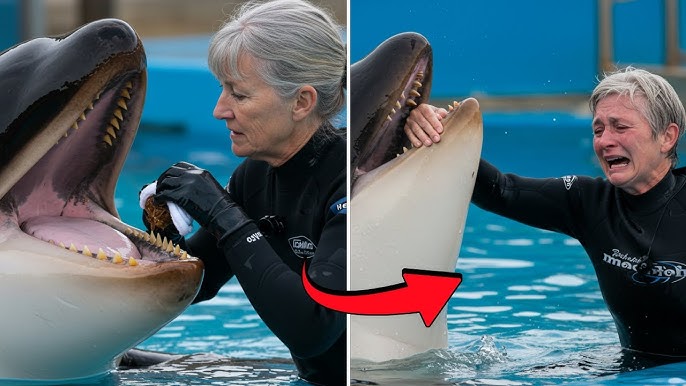The marine entertainment industry is reeling after a horrifying incident turned a joyous performance into tragedy. Jessica Hartwell, a 29-year-old senior orca trainer beloved by colleagues and adored by audiences, lost her life in the most brutal and unexpected way. During a weekend show that drew hundreds of spectators, she was pulled under by a killer whale she had trained for years, never resurfacing alive.
In the aftermath, a chilling twist surfaced: Jessica had been scheduled to help with an emergency medical procedure for the very whale that ended her life. The orca had allegedly swallowed foreign metallic objects, and surgery was imminent. The news has left the public not only mourning but also questioning whether this tragic end was an accident—or a symptom of something deeper and darker at the heart of marine entertainment.

The Final Show: When Trust Shattered in an Instant
The atmosphere inside the aquatic stadium was electric just moments before tragedy struck. Families cheered, children waved foam fins, and Jessica—known for her calm stage presence and radiant confidence—entered the tank to begin the main routine.
“It was magical at first,” one spectator recalled. “Jessica signaled, and the orca responded beautifully, leaping high into the air. She kissed its nose, and everyone applauded. But then, without warning, the energy shifted.”
Witnesses describe the moment as surreal. The whale, weighing nearly 6,000 pounds, suddenly lunged, clamping down on Jessica’s side and dragging her into the depths. Trainers rushed to intervene, but seconds turned to minutes, and panic consumed the stadium. Screams echoed as staff urged the audience to leave. Divers entered the water, but Jessica was gone.
Her lifeless body was recovered shortly after, the spectacle leaving an indelible scar on all who witnessed it.
The Whale’s Hidden Agony
What made this case especially shocking was not just the violent attack, but the revelation that the orca was in distress long before the incident.
Marine park insiders later revealed that the animal had displayed erratic behavior in the weeks leading up to the tragedy: refusal of food, violent thrashing, and strange vocalizations. A medical scan reportedly detected foreign objects lodged inside the whale’s stomach—believed to be metallic fragments from broken equipment.
Jessica, one of the park’s most experienced trainers, had been preparing to participate in the surgical procedure designed to remove the objects. In other words, she was working to save the whale’s life.
The devastating irony has left staff members haunted. “She loved that whale,” one colleague whispered. “She was the only one it trusted. To think she died this way, knowing she was about to help it, is unbearable.”
Captivity Under Fire: Are Orcas Too Dangerous to Keep?
The incident has reignited a decades-long debate over the ethics and dangers of keeping killer whales in captivity.
Orcas are apex predators in the wild, traveling up to 100 miles a day and living in tight-knit family pods. In aquariums, they are confined to tanks a fraction of the size of their natural range, often isolated from relatives, and forced into repetitive performances. Critics argue that captivity leads to psychological trauma, manifesting in aggression and self-destructive behavior.
This tragedy echoes a grim history:
-
In 2010, veteran trainer Dawn Brancheau was killed by an orca named Tilikum at SeaWorld Orlando, sparking global outrage and the influential documentary Blackfish.
-
Over 70 documented incidents of orca aggression toward trainers exist, with several resulting in serious injury or death.
-
In the wild, there has never been a single recorded fatal attack on a human.
Experts suggest this contrast is telling: captivity alters the psychology of these intelligent creatures, creating pressure-cooker conditions that can explode in moments of violence.
Jessica’s Devotion: Between Passion and Risk
Despite the risks, Jessica was deeply committed to her work. Described by colleagues as “fearless but gentle,” she believed in building trust with the animals rather than controlling them. Videos from past shows show her laughing, hugging her whales, and often speaking about their intelligence with awe.

“She never thought of them as props,” said a coworker. “Jessica genuinely believed she was giving them love, purpose, and care. But she also knew the dangers. Every trainer knows. You just never think it will happen to you.”
For many, Jessica’s death is not just a personal tragedy but a reminder of the price trainers pay for a career built on the fragile bond between human and predator.
The Public’s Reaction: Mourning and Outrage
As news of Jessica’s death broke, social media erupted with grief, shock, and anger. Vigils were held outside the marine park, with mourners leaving flowers and handwritten notes. “She gave her life for the animals she loved,” read one sign.
But alongside sorrow came outrage. Activists renewed their call for an end to orca captivity, labeling the industry exploitative and unsafe. Hashtags like #JusticeForJessica and #FreeTheWhales trended globally.
Even those who had once defended marine parks struggled to justify what happened. “If we continue to confine orcas for human entertainment,” one animal rights group stated, “Jessica’s death will not be the last.”
The Whale’s Fate: Victim or Killer?
In the aftermath, the whale’s future hangs in the balance. Some demand it be euthanized, arguing that a dangerous predator cannot remain in contact with humans. Others insist the orca is as much a victim as Jessica—suffering from captivity, illness, and stress beyond its control.
Marine biologists caution against blaming the animal. “This wasn’t an act of calculated violence,” one expert explained. “It was the inevitable breaking point of a highly intelligent creature trapped in conditions that go against its nature.”

The haunting detail remains: Jessica was preparing to heal the whale, not punish it. In many ways, her death forces society to confront whether we truly understand the consequences of confining wild giants for spectacle.
A Legacy in Question
For Jessica’s family and colleagues, the pain is raw. But some believe her death might spark the very change she hoped for: better conditions, greater compassion, and maybe even an end to captivity altogether.
“Jessica always said the whales were speaking to us,” recalled one friend. “Maybe this is the message we’ve ignored for too long.”
As investigations continue and the world debates the whale’s fate, one truth remains undeniable: Jessica’s story is a tragic reminder of both the beauty and danger of bridging the gap between human and wild.
Her life was one of passion. Her death, a warning.
And her legacy—whether it sparks reform or fades into another entry in captivity’s grim history—rests with us.




